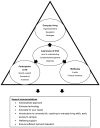A Qualitative Investigation into the Experiences of Students with Developmental Coordination Disorder (DCD/Dyspraxia) in Higher Education
- PMID: 39727511
- PMCID: PMC11675472
- DOI: 10.3390/ejihpe14120203
A Qualitative Investigation into the Experiences of Students with Developmental Coordination Disorder (DCD/Dyspraxia) in Higher Education
Abstract
Developmental coordination disorder (DCD/Dyspraxia) is a commonly misunderstood and under-recognized specific learning difficulty (SpLD) in educational settings. This lifelong condition affects fine and gross motor coordination and significantly interferes with many activities of daily living, academic achievement, and employment opportunities. However, most Higher Education Institutions (HEIs) are unaware of its prevalence within their context, even though 5% of the general population have DCD and the enrolment of students in UK Higher Education with a known disability has increased by 42.4% between 2018 and 2023. Thus, understanding the lived experiences of students with DCD within Higher Education in the UK remains a considerable gap in knowledge. Through the use of focus groups, the lived experiences of 10 students with DCD at two UK HEIs were investigated. The thematic analysis identified four main themes: 'Awareness of DCD', 'Participation in Higher Education for individuals with DCD', 'Wellbeing', and 'Everyday living'. Students shared that HEIs appeared to lack awareness of DCD and felt they had an inability to specify the correct support at university. Importantly, whilst the students in the study were not always confident in identifying the specific support they needed, they shared the strategies they used to aid their university experience. The students described the physical toll that many everyday living tasks can take, which subsequently negatively impact academic participation and wellbeing. On a positive note, many of the students discussed positive experiences at university, such as enjoying their own autonomy (and flexibility) to be independent and inform strategies for their own learning. Importantly, the findings from this work highlight the complexity and heterogeneity of DCD and the need for a tailored approach to supporting individuals with this condition. Given the importance of educational qualifications to enter the workplace, and the contribution of employment to quality of life, these findings help signpost areas where HEIs can improve the experiences of students with DCD that may also enhance academic success.
Keywords: developmental coordination disorder; dyspraxia; higher education; neurodevelopmental conditions; specific learning difficulty; students.
Conflict of interest statement
The authors declare no conflicts of interest.
Figures
Similar articles
-
Harnessing real-life experiences: the development of guidelines to communicate research findings on Developmental Coordination Disorder/dyspraxia.Res Involv Engagem. 2024 Aug 8;10(1):84. doi: 10.1186/s40900-024-00611-0. Res Involv Engagem. 2024. PMID: 39118133 Free PMC article.
-
Impact of summer programmes on the outcomes of disadvantaged or 'at risk' young people: A systematic review.Campbell Syst Rev. 2024 Jun 13;20(2):e1406. doi: 10.1002/cl2.1406. eCollection 2024 Jun. Campbell Syst Rev. 2024. PMID: 38873396 Free PMC article. Review.
-
Journeying with developmental coordination disorder: The family experience.Afr J Disabil. 2023 Dec 19;12:1210. doi: 10.4102/ajod.v12i0.1210. eCollection 2023. Afr J Disabil. 2023. PMID: 38223430 Free PMC article.
-
The experiences of foundation doctors with dyspraxia: a phenomenological study.Adv Health Sci Educ Theory Pract. 2021 Aug;26(3):959-974. doi: 10.1007/s10459-021-10029-y. Epub 2021 Feb 9. Adv Health Sci Educ Theory Pract. 2021. PMID: 33559779 Free PMC article.
-
Children and young people's experiences of living with developmental coordination disorder/dyspraxia: A systematic review and meta-ethnography of qualitative research.PLoS One. 2021 Mar 4;16(3):e0245738. doi: 10.1371/journal.pone.0245738. eCollection 2021. PLoS One. 2021. PMID: 33661934 Free PMC article.
Cited by
-
Associations Among Developmental Coordination Disorder Traits, Neurodevelopmental Difficulties and University Personality Inventory Scores in Undergraduate Students at a Japanese National University: A Cross-Sectional Correlational Study.Brain Sci. 2025 Aug 21;15(8):895. doi: 10.3390/brainsci15080895. Brain Sci. 2025. PMID: 40867226 Free PMC article.
References
-
- Cameron H., Coleman B., Hervey T., Rahman S., Rostant P. Equality law obligations in higher education: Reasonable adjustments under the Equality Act 2010 in assessment of students with unseen disabilities. Leg. Stud. 2019;39:204–229. doi: 10.1017/lst.2018.31. - DOI
-
- Higher Education Statistics Agency HE Student Enrolments by Sex, Age Group, Disability Status, Ethnicity, First Year Marker, Level of Study, Mode of Study and Country of HE Provider. 2023. [(accessed on 15 December 2024)]. Available online: https://www.hesa.ac.uk/data-and-analysis/students/whos-in-he.
-
- Equality Act. [(accessed on 15 December 2024)];2010 Available online: https://www.legislation.gov.uk/ukpga/2010/15/contents.
-
- DSUK Going Back Is Not a Choice—Accessibility Lessons for Higher Education. 2022. [(accessed on 15 December 2024)]. Available online: https://disabledstudents.co.uk/not-a-choice/
LinkOut - more resources
Full Text Sources
Miscellaneous



